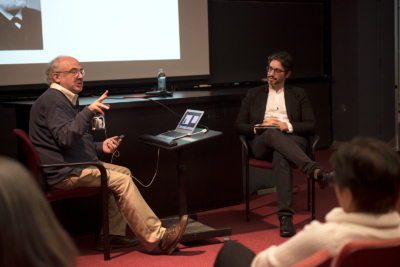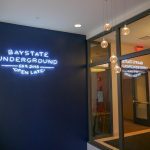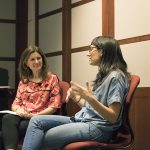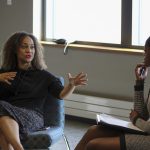
With a multitude of spooky activities this past weekend, some Halloween enthusiasts started their “Halloweekend” by attending a Friday event that took more of a scientific approach to fear.
The “X-Position with Vadim Bolshakov: The Panic Lab” took place in the Harvard Science Center and answered questions including what does it mean to fear, what is fear and where do our fears come from.
Hosted by the Harvard Extension Student Association, the event was the second to be featured in the X-Position series. Although the X-Position is an interdisciplinary series, this is the first time the center hosted an event that sheds light on the scientific field.
“This [Fear Lab] was definitely heavy in terms of contents,” Benjamin Basseri, the director of events at the center, said. “We live in an environment designed for human bodies but perhaps not human emotions. It’s been a long time since we lived in caves though I wonder if our emotional systems have actually caught up, or how much of us still lurks in the caves hiding in the dark.”
“Dr. Bolshakov’s work strives to illuminate these primal mechanisms,” he added.
Basseri said that the Halloween season sparked the initial idea of the lab.
“It is Halloween season, so we thought what better way to make productive use of our time than … to talk about scary things — let’s talk about what it is to be scared,” Basseri said to the audience, inciting laughter as he started off the Panic Lab and introduced the star guest of the night.
Vadim Bolshakov, a professor of psychiatry at Harvard Medical School and the director of McLean’s Cellular Neurobiology Laboratory at McLean Hospital, has been studying the mechanisms of fear memories and conditioning to better understand how fear, both unconscious and conscious, affects mental disorders.
Moderated by Basseri, Bolshakov opened up a discussion regarding innate fear versus learned fear and whether these two types could be controlled to treat human conditions.
Throughout the discussion panel, Bolshakov talked about his research — he used mice, since their brain mechanics work similarly to that of a human, and how certain nerves could be triggered to control mechanics of fear memories.
“I thought it was a very interesting event,” attendee Andrey Bayadzhan, 25, of Cambridge, who is an inventor, said. “My work has nothing to do with this field, but I liked it very much. My favorite part was when Dr. Bolshakov explained the bits about photosensitive proteins and how they react differently to when you shed light upon different colors.”
Regarding fear and mental disorders, Bolshakov explained that fear, both innate and learned, creates a significant stress on a human body that later may manifest into anxiety disorders or phobias that can hinder someone from participating normally in society. Understanding how fear mechanisms work to treat people from these disorders is the main goal of Bolshakov.
“Many people should be curious about these things,” Bayadzhan said.
Bolshakov also described the reasoning for his research into fear.
“I studied synopsis [at Columbia University],” he said when asked about where his passion for mechanism of fear conditioning came from. “But fear memory is easily quantifiable, and circuits are kind of well known – that’s why I became interested in these models.”
Bolshakov described his ongoing research as an “exciting time right now,” and expanded his topics of research in the field.
“It would be good to be able to apply modern technological advancements to treat human conditions,” he said. “We could basically intervene in certain conditions, like depression, anxiety, drug addiction, and perhaps we can improve memory, moderate addictive behaviors and treat disorders such as post-traumatic stress disorder.”
Bolshakov ended the night on a lighter note, expressing his excitement over the next steps in the scientific field. However, he and the audience mutually agreed on this — the new advancements in the field of fear is certainly a fearful thing, as it could eventually lead to discoveries that can control the emotion, and even further, memories of a human being.
Future installments by the center will discuss 21st century intellectual property issues, the future of journalism, and education reform.














